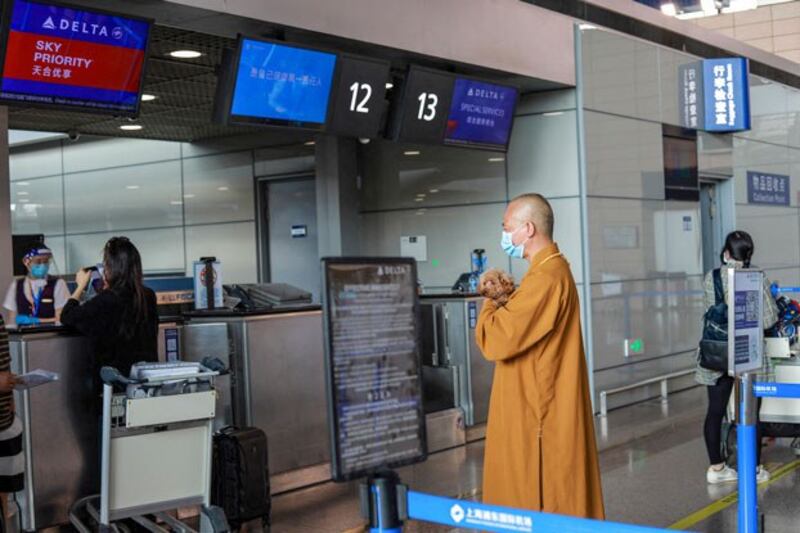Four ethnic Tibetan travelers with EU passports say they were questioned for hours upon arrival in China – and two were ultimately deported – despite Beijing’s visa-free policy for citizens of several European countries for visits of up to 15 days.
Belgian citizen Thubten Gyatso, who was traveling to meet family in Qinghai province via Shanghai in early April, said authorities detained him and his 6-year-old son for about 18 hours at Shanghai’s Pudong International Airport, where at least six Chinese officials took turns grilling him in a small room.
“During the 18 hours, we were provided with only one meal, along with water and a few biscuits,” said Gyatso, adding that he and his son could not leave the room except to use the restroom, during which they were escorted by two policemen, he said.
When authorities searched Gyatso’s belongings and his mobile phone, they found pictures of the Dalai Lama and the Tibetan flag – both banned in the Tibetan Autonomous Region.
Gyatso explained to them that the leader of Tibetan Buddhism – whom Beijing views as a separatist – is a “global leader, universally respected, with numerous images freely available online.”
“My reverence for His Holiness transcends boundaries, and if the Chinese authorities prohibit my entry into Tibet due to these images, I accept it without regret,” he said.
Authorities also questioned Gyatso about his escape from Tibet to India in 1994, his move to Belgium and his citizenship status there, and details about family members’ professions, he said.
After 18 hours, the officials told him that he would not be allowed to return to his hometown because of the photo of the Dalai Lama and the Tibetan national flag, Gyatso said.
They then made Gyatso and his son board a plane at 1 a.m. on April 4 to London, where he is currently based.

Attempt to boost tourism
In an apparent effort to increase tourism and foreign investment, China has allowed visa-free entry to travelers from five European countries — Germany, France, Italy, Spain and the Netherlands — for business, tourism, family visits and transit for up to 15 days until Nov. 30, 2024
The Ministry of Foreign Affairs later expanded the policy to citizens of Belgium, Austria, Switzerland, Ireland, Hungary and Luxembourg.
In return, the Chinese government hopes more countries will facilitate visas for Chinese citizens and work with Beijing on networks for faster cross-border travel and the speedy resumption of international passenger flights, according to a March statement by the ministry, citing Foreign Minister Wang Yi.
“This will make it more convenient for Chinese citizens to travel abroad, and make foreign friends feel at home in China,” it said.
But that doesn’t seem to apply to European citizens of Tibetan ethnicity.
In March, A French citizen with family in the Tibetan Autonomous Region was denied entry into Tibet and told to redirect his travel to Chengdu to where his family members would have to travel to meet him.
Some Tibetans from Europe have been able to travel to their hometowns to meet relatives, though their families have reported similar accounts of heightened scrutiny owing to their Tibetan background.
In March, authorities at Shanghai’s Pudong International Airport interrogated a Tibetan with German citizenship for six hours before letting him travel onward to visit his family in Tsolho Tibetan Autonomous Prefecture in Qinghai province.
“Despite conducting a thorough search of my phone, other tech gadgets and luggage, authorities did not find any photos of the Dalai Lama, so they allowed me to travel to my hometown in Amdo,” he said, referring to one of the three traditional Tibetan regions. The man spoke on condition of anonymity for fear of reprisal by Chinese authorities.
But upon his arrival in Qinghai province, police subjected him to further interrogation, he added.
Translated by Tenzin Palmo and Tenzin Dickyi for RFA Tibetan. Edited by Tenzin Pema for RFA Tibetan, and by Roseanne Gerin and Malcolm Foster.
